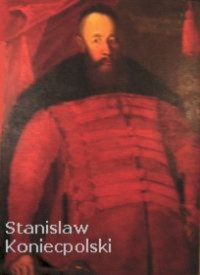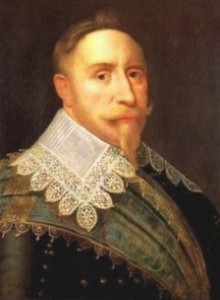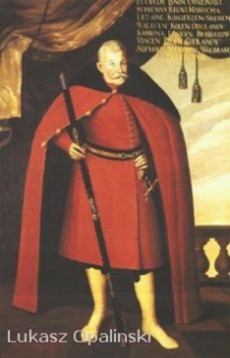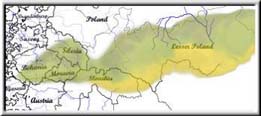
When Jozef finished with his presentation, the immediate reaction of his two listeners was about what he'd expected.
Silence. Total, complete silence.
After a few seconds, Lukasz Opalinski sighed faintly and leaned back a little further in his heavily-upholstered armchair. He gave the big hetman sitting to his left a glance that was just short of apprehensive.
For his part, Koniecpolski's expression might have been that of a statue. Josef could not detect a trace of whatever thoughts or emotions might be stirring within that large and imposing head. The hetman simply gazed at him, almost serenely.
And . . . said nothing. Nothing at all.
Eventually, Jozef realized that Koniecpolski didn't plan to say anything, either. The hetman wasn't going to agree, nor was he going to argue.
Instead . . .

"These are matters for the king and the Sejm to decide," the hetman said heavily. "So there is no point in discussing them further here."
Matters for the king and the Sejm to decide.
Given the current king and the Sejm as it existed, that amounted to saying that nothing would be done. The Vasa dynasty that had come to rule the Commonwealth of Poland and Lithuania after the Jagiellonian dynasty died out—insofar as any monarch could be said to "rule" that land dominated by noblemen—was a branch of the same dynasty that ruled Sweden. Wladislaw IV, like his father Zygmunt III, was obsessed with gaining the Swedish crown to which he felt he was entitled. He viewed the land he actually ruled as nothing much more than a footstool to reach the land he wished to rule. He'd even said in public that he disliked Poland.
In person, it was true—so Jozef had been told, anyway—the new king was a charming fellow. In that regard, quite unlike his sour and gloomy father. But what difference did that make? Where the Jagiellonian dynasty that had previously ruled the Commonwealth had taken care to ally with the middling classes against the great noblemen—much as the Swedish Vasas had done—the Polish branch of the Vasa family showered favors and largesse on those same magnates. The end result, after Zygmunt's long reign of forty-five years, was that the Commonwealth was now completely under the thumb of the great landowning families. In the real world, once you stripped away the pretensions of the szlachta, it was the magnates who dominated the Sejm.
How likely was it, then, that such a Sejm and such a king would agree to begin dismantling serfdom?
The Americans had a clever saying that applied. A snowball's chance in hell.
But, in truth, Jozef couldn't say he was disappointed. He hadn't really expected the Grand Hetman of the Commonwealth to react any differently. For all of Stanislaw Koniecpolski's undoubted virtues, the man was very much the product of his class. Nor was he a man whose temperament inclined him toward questioning his background and upbringing, or his own attitudes. He was a brilliant soldier, certainly; an upstanding and—by his lights—honest man, just as certainly. But a reflective man? Someone capable of analyzing his own biases objectively?
Not in the least. No more so than a lion. Or a brick wall, for that matter.
So be it. At some point, Jozef would probably have to start making difficult decisions of his own. For the moment, however, his personal loyalty to Koniecpolski remained. The world was an imperfect place, after all.
"Now, another matter," said Koniecpolski. He gave Jozef something in the way of a smile. "Hopefully, a more cheerful one. I keep hearing rumors that the Americans are well-disposed toward Poland, whatever the damn Swede thinks. Is that true, nephew?"
Jozef made a face, and started scratching his head. "Well . . . It's complicated. On the one hand, yes. They tend to have a favorable attitude toward Poles. Quite favorable, actually."
"Why?" asked Lukasz.
"Two reasons. The first and simplest is that the country they came from was a country created by immigrants. Many of those immigrants were Polish."
The hetman grunted. "So I've heard. But I would assume many of them were Swedes also."
"There were immigrants from Sweden, yes, and other Scandinavian countries. But not so many as there were Poles."
He had to restrain himself from adding: That's because the Scandinavian lands were by and large well-managed, so they did not produce a flood of unhappy emigrants. Which Poland most certainly did, because of the disastrous policies pursued by Poland's rulers in earlier centuries.
Instead, he simply said: "And most of the Scandinavian immigrants settled elsewhere in America. Places called Minnesota and Wisconsin. There were many more Poles in the area from which Grantville came."
He made a little wagging gesture with his hand. "But that's only one reason, and perhaps not the most important. Some Poles—even noblemen!—helped the Americans in their war of independence with England. And, in much more recent times—'recent,' at least, as Americans see it—their principal antagonist was Russia. And since Poland was under Russian control—"
Again, he has to restrain himself from adding: because of idiots like those who control the throne and Sjem—and you, my dear uncle, being honest about it.
"—and Poles were inclined to chafe at the situation, the Americans were favorably disposed toward us."
Koniecpolski nodded. "And on the other hand?"
Jozef shrugged. "Despite their reputation for fanciful notions—what they themselves call 'romanticism'—the Americans are every bit as inclined toward being practical and hard-headed as anyone else. The fact is, whether they are favorably disposed to us or not, they have formed an alliance with the king of Sweden. There are some aspects to that alliance which do not particularly please them, true. Still, by and large, most Americans think their bargain with Gustav Adolf has worked quite well for them. They are not about to jeopardize it because of some favorable sentiments toward us—which, when you come right down to it, are rather vague and nebulous sentiments in the first place."

Koniecpolski nodded again. His eyes never left Jozef's face, though. "And there's something else."
Jozef took a deep breath. "Yes, there is. Whatever favorable sentiments may exist among the Americans toward we Poles as a people, there are no favorable sentiments—not in their leadership, at any rate—toward the Commonwealth as it exists today. I have heard some of their speeches, uncle, and read a great many more of their writings. That includes, for instance, a speech given by Michael Stearns in which he specified that the two great evils which loom before the world today are chattel slavery in the New World and the second serfdom in eastern Europe. Both of which must be destroyed."
"His term?" asked Koniecpolski. "Destroyed?"
"One of his terms," Wojtowicz said harshly. "Others were 'eradicated,' 'crushed,' and 'scrubbed from existence.' He is quite serious about it, uncle. He believes the great evils which afflicted the world he came from were caused, in great part, by the ever-widening divergence between the western and eastern parts of Europe. This, he claims, is what underlay the two great world wars that were fought in the century from which he came, in the course of which tens of millions of people died. And he lays the blame for that divergence upon the fact that, where serfdom vanished in western Europe, it had a resurgence in the eastern lands."
But, again, the hetman's face had closed down.
It was odd, in a way. When it came to martial matters, Stanislaw Koniecpolski had a supple and flexible mind. For all the man's personal devotion to ancient methods of warfare—he probably was the greatest archer in Poland; certainly the greatest mounted archer—he'd proven quite capable all his life of adapting to new realities. He knew how to use modern infantry, artillery and fortifications; the so-called "Dutch style" of warfare. He had proven to be skilled at combining land and naval operations, too, although he was not a naval commander himself. Yet that same adaptability ended abruptly whenever Koniecpolski confronted a problem of a social rather than strictly military nature.
Still, you could not in fairness characterize him as a reactionary—what the Americans would call a "hidebound dinosaur." If Stanislaw Koniecpolski was comfortable with the existing Polish and Lithuanian conditions, he was also famous for being utterly scrupulous in respecting the Commonwealth's laws and legal procedures. As much mutual trust as there was between the hetman and the king, for instance—this had been true with the former monarch also—Koniecpolski would flatly refuse to carry out any royal command or instruction unless it had the Sjem's approval required by law.
So . . .
Koniecpolski would be no help, certainly, in making the profound changes in the Commonwealth that Jozef knew were necessary if the great realm were to survive. He would even, at times, be an active hindrance. But he wouldn't be a bitter enemy, as such—as would, for instance, such great magnates as Samuel Laszcz, the Sheriff of the Crown, or the Seneschal of Lithuania, Samuel Osinsky.
While Jozef had been ruminating, Koniecpolski's gaze had still never left his face. Eventually, with that same half-serene smile, the hetman said: "I know that you are unhappy with me, nephew. So I need to ask. Can you continue to serve me anyhow?"
Jozef nodded. "Yes, uncle. I can."
"Good. I am very pleased with what you have done so far. And now, I must leave to deal with some other business." He gave Wojtowicz and Opalinski a cheerful grin. "Unlike you youngsters, who have the luxury of obsessing over single matters, we men of maturity and substance must deal with many."
Jozef smiled. "Ah, yes. What the Americans call 'multi-tasking.' But they say only women are really good at it. So perhaps women should be put in charge of the Commonwealth's affairs."
For the first time that day, a trace of alarm came to the hetman's face. "What a dreadful idea!"
After Koniecpolski left, Lukasz rose from his chair and went over to the side table which was heavily laden with many bottles of wine.
"Shall we spend the rest of the day getting drunk?"
Jozef sighed. "May as well, I suppose."
Opalinski filled two large goblets and handed one to Wojtowicz before resuming his seat.
"Be realistic, Jozef. You can't really have expected the hetman to agree with your recommendations."
"No, of course not. I just . . ."

"Yes, I understand. You felt obligated to raise them with him directly. That way"—he paused to take a long quaff of wine—"you won't feel quite so guilty when you start maneuvering around him."
Jozef made a face. "Maneuvering around him. That sounds . . . ugly."
Opalinski shrugged. "I suppose it is, if you choose to look at it as a matter of aesthetics. But it's not, you know. It's simply a matter of our political survival."
Wojtowicz gave his friend a somewhat skeptical look. "You didn't exactly seem thrilled yourself, at what I had to say."
"Well, of course not!" Lukasz began to throw up his hands with exasperation. Fortunately, he remembered to stop the gesture before he slopped wine all over the floor. And a very fine floor it was, too. Of course, like the floors of all Polish noblemen, be they never so high and exalted, it would be no stranger to spilled liquor.
Still, it would have been a waste of good wine. What was possibly worse, they would have had to summon a servant to clean up the spill. These were difficult subjects to discuss openly under the best of circumstances. Doing so in the presence of a servant's ears would be impossible.
Jozef smiled slightly, then. He could remember a time when he wouldn't have thought twice about discussing anything in the presence of servants. Servants were like furniture. There for a useful purpose, that was all. The fact that the useful purpose might coincidentally happen to be a human being was not something that registered very clearly or very often.
But if there was one thing he'd learned thoroughly since he'd agreed to organize and lead the hetman's spy network in the United States of Europe, it was that servants did indeed have ears. And what was more, they had brains to process the information they heard and pass it on to others.
Others such as Jozef Wojtowicz himself. And the Lord only knew how many spymasters active in the Polish and Lithuanian Commonwealth on behalf of its enemies. They'd certainly have an easy time of it. What the Americans would call a "field day." Between their arrogance and their drunkenness, Polish and Lithuanian szlachta wouldn't even notice the servants moving about them while they babbled whatever they chose to in the "privacy" of their homes.
"And now you're looking very solemn," Lukasz said. "I'd even say, 'glum,' if I didn't know you for the insouciant sprite that you are."
Jozef smiled at him. "I was just thinking—not with any great pleasure, I assure you—that I'll probably find myself organizing my own spy network soon enough. Here at home, so to speak. And how easy it would be, compared to the relative difficulty of operating among the Germans and Americans. Especially the Americans. Who, as naïve as they so often are, almost never forget that servants have ears."
"Servants?" Seeming a bit confused, Lukasz looked around him. Not with the focused eyes of someone trying to spot a well-known object or phenomenon, but with the slightly glazed eyes of someone trying to visualize them in the first place. "Oh, them."
After a moment, he and Jozef shared a chuckle. Then, a quaff of wine. And then, a long moment that was quite a bit more solemn.
Finally, Lukasz said: "No, Jozef, I am certainly not thrilled by your proposals and recommendations. Unlike my rambunctious brother Krzysztof, I am inclined toward a relaxed, pleasant—even sedate—existence. Left to my own devices, the life of a nobleman suits me quite nicely. Alas . . ."
Jozef nodded. "The Americans have an expression for it, which they say they stole from the Chinese, who viewed it as a curse. 'May you live in interesting times.'"
Opalinski grimaced. "Interesting times, indeed." He drained what was left in his goblet, rose to his feet, and headed back toward the side table with the wine bottles. "So, we're about to get to the real unpleasantness of the day. Let me fortify myself first."
He open another bottle and offered Jozef some more, which he accepted. Then, refilled his own goblet—right up to the very brim. It was a big goblet, too.
"What do you mean, the 'real unpleasantness'?" asked Wojtowicz.
Lukasz sat down, scowling at him. "Oh, stop playing the innocent. What do you want me to do?"
"Oh." In point of fact, Jozef had never really concentrated his thoughts on that subject, prior to this moment. But now that he did . . .
For all his frequent protestations of idleness and dissolution and his natural inclinations and talents thereto, Lukasz Opalinski was actually a very competent and capable man. Even energetic, when he chose to be. And, in Jozef's opinion, quite a bit more thoughtful than his older brother. There was undoubtedly something in the term "brilliant" which applied to Krzysztof Opalinski. But, like many such people, the brightness of the mind left little room for shades and subtleties of thought.
Not so, his younger brother Lukasz. You could even say he was a man made for the shades and subtleties.
"Well. Now that I think about it, Lukasz. We actually should start organizing our own spy network here in the Commonwealth. I can't attend to it myself, you understand. As often as not, I'll need to be somewhere to the west on the hetman's business. So why don't you take on the work?"
Lukasz sipped at his wine. "Well enough. I imagine being a spymaster is usually sedentary sort of work, which certainly suits me."
You might be surprised, thought Jozef, remembering two occasions—one in particular—in which he'd found his fleet footing and good lungs essential to his well-being.
Of course, he saw no reason to say it out loud.
"But first, the critical question," Lukasz continued.
"Yes?"
He gave Wojtowicz a look from beneath lowered brows. "Who—exactly—is this 'we' that needs to start a spy network in the Commonwealth?"
"Ah." Jozef sipped at his own wine. "Good question."
"Yes, I thought so. Somewhat critical, actually."
Jozef considered the problem. It really was a very good question.
"Well, for the moment... I'd say that 'we' is simply you and me, Lukasz. You might think of it as a cabal starting very, very small—but with ties in both the camps of revolution and . . . you can't say 'reaction,' exactly. That wouldn't be fair to the hetman."
Lukasz smiled. "As fond as you've become of them, surely you can dredge up some appropriate American term."
"I can, as it happens. The Americans would call it 'the establishment.' A rather nice term for the purpose, I think."
Opalinski nodded. "Very well, then. A tiny two-person cabal with ties to both the establishment of the Commonwealth and those—some of those, at any rate—who would undo that same establishment. Now, the second question. What is our goal and purpose?"
"Pretty much the same as those of your brother, I'd say. The truth is, there's not much in my recommendations and proposals that I think Krzysztof would object to. Where we differ is mostly in our chosen methods. I'd really just as soon avoid a revolution if we could, Lukasz—or, what's far more likely, the bloodbath that will accompany a failed revolution."
Opalinski thought about it, and then drained his goblet in one long and practiced swallow. What the Americans in Grantville at the now-famous Thuringian Gardens—Jozef had spent many hours there himself—would call a chug-a-lug.
"Sounds about right to me," he pronounced, wiping his lips. "And now, it's your turn to get up and open another bottle. You know how easily I get fatigued by strenuous labor."
